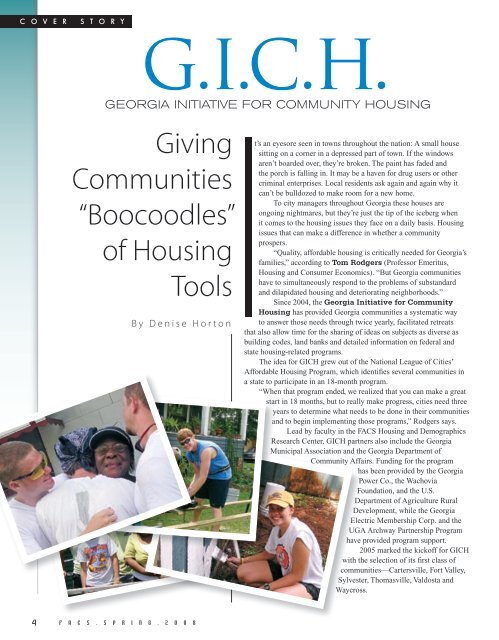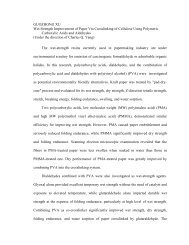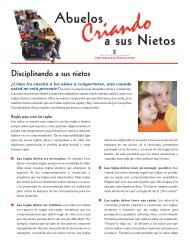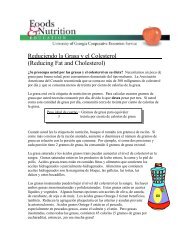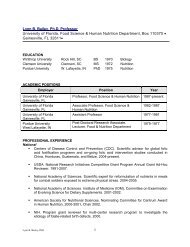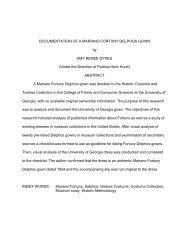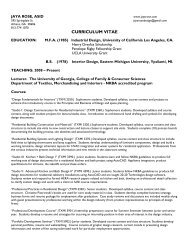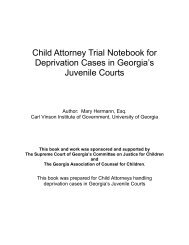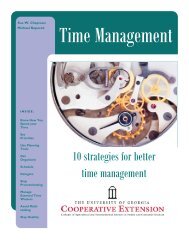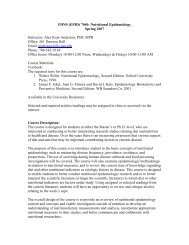G.I.C.H. - University of Georgia
G.I.C.H. - University of Georgia
G.I.C.H. - University of Georgia
You also want an ePaper? Increase the reach of your titles
YUMPU automatically turns print PDFs into web optimized ePapers that Google loves.
C o V e r S t o r Y<br />
G.I.C.H.<br />
GeorGia initiative for Community HousinG<br />
Giving<br />
Communities<br />
“Boocoodles”<br />
<strong>of</strong> Housing<br />
By Denise Horton<br />
4 F A C S . S P R I N G . 2 0 0 8<br />
Tools<br />
t’s an eyesore seen in towns throughout the nation: A small house<br />
sitting on a corner in a depressed part <strong>of</strong> town. If the windows<br />
aren’t boarded over, they’re broken. The paint has faded and<br />
the porch is falling in. It may be a haven for drug users or other<br />
criminal enterprises. Local residents ask again and again why it<br />
can’t be bulldozed to make room for a new home.<br />
To city managers throughout <strong>Georgia</strong> these houses are<br />
ongoing nightmares, but they’re just the tip <strong>of</strong> the iceberg when<br />
it comes to the housing issues they face on a daily basis. Housing<br />
issues that can make a difference in whether a community<br />
prospers.<br />
“Quality, affordable housing is critically needed for <strong>Georgia</strong>’s<br />
families,” according to Tom Rodgers (Pr<strong>of</strong>essor Emeritus,<br />
Housing and Consumer Economics). “But <strong>Georgia</strong> communities<br />
have to simultaneously respond to the problems <strong>of</strong> substandard<br />
and dilapidated housing and deteriorating neighborhoods.”<br />
Since 2004, the <strong>Georgia</strong> Initiative for Community<br />
Housing has provided <strong>Georgia</strong> communities a systematic way<br />
to answer those needs through twice yearly, facilitated retreats<br />
that also allow time for the sharing <strong>of</strong> ideas on subjects as diverse as<br />
building codes, land banks and detailed information on federal and<br />
state housing-related programs.<br />
The idea for GICH grew out <strong>of</strong> the National League <strong>of</strong> Cities’<br />
Affordable Housing Program, which identifies several communities in<br />
a state to participate in an 18-month program.<br />
“When that program ended, we realized that you can make a great<br />
start in 18 months, but to really make progress, cities need three<br />
years to determine what needs to be done in their communities<br />
and to begin implementing those programs,” Rodgers says.<br />
Lead by faculty in the FACS Housing and Demographics<br />
Research Center, GICH partners also include the <strong>Georgia</strong><br />
Municipal Association and the <strong>Georgia</strong> Department <strong>of</strong><br />
Community Affairs. Funding for the program<br />
has been provided by the <strong>Georgia</strong><br />
Power Co., the Wachovia<br />
Foundation, and the U.S.<br />
Department <strong>of</strong> Agriculture Rural<br />
Development, while the <strong>Georgia</strong><br />
Electric Membership Corp. and the<br />
UGA Archway Partnership Program<br />
have provided program support.<br />
2005 marked the kick<strong>of</strong>f for GICH<br />
with the selection <strong>of</strong> its first class <strong>of</strong><br />
communities—Cartersville, Fort Valley,<br />
Sylvester, Thomasville, Valdosta and<br />
Waycross.


